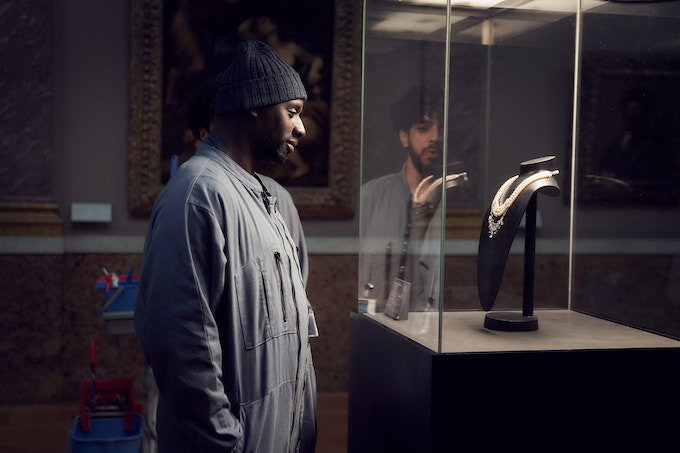Lupin is the Netflix show that everybody is talking about. In less than a month on the platform, it’s reached 70 million households. That’s more than The Queen’s Gambit and approaching Bridgerton levels of success, not to mention groundbreaking for a French-language show. This week, the streaming platform announced that series two will be arriving this summer and we can’t wait. Here are five reasons to add Lupin to your watchlist right now.

Omar Sy is amazing as Assane Diop
Omar Sy, 43, could not be more perfectly cast to play Assane Diop, the gentleman gem thief whose story unfolds across the series. He doesn’t just carry the show on his shoulders—he is the show. You might recognise Sy from Hollywood roles in X-Men: Days of Future Past (2014) and Jurassic World (2015), but it’s Lupin that marks his arrival as an international leading man.
Though Assane is a thief, he certainly isn’t the bad guy and it’s impossible not to be hypnotised by the charm and charisma Sy brings to the role. He’s a massive presence on screen, but rarely do we see him needing to use his fists—his killer smile and razor-sharp brain are his deadliest weapons. Throughout the series, we flashback to Assane’s childhood as a Senegalese immigrant in a white world in Paris, and the chain of events that made him the man he is. The more layers we peel back, the more we grow to love him.
It’s gloriously old fashioned
Lupin is an unashamedly big, mainstream production. It’s glossy, not gritty, and refreshingly unpretentious. It isn’t trying too hard to be cool or overly stylised. The first three episodes were directed by Louis Leterrier, who also made Now You See Me (2013) starring Mark Ruffalo and Woody Harrelson, about a team of illusionists who pull off a series of bank heists. The Lupin he creates feels very much in the world of Ocean’s Eleven (2001) or Roger Moore-era James Bond. There’s no real sex or violence, and you don’t miss that at all. This is a show a family could binge-watch and then dissect together.

Diversity is important
It absolutely should not be downplayed how important it is that the lead role in a show such as Lupin—Netflix’s biggest non-English-language title ever, and a massive global hit—is played by a Black actor, and that racism and the treatment of Assane and his father as immigrants in Paris is stitched into the show’s narrative. You can still count the number of Black action heroes on screen on one hand. With Lupin, and the gloriously multicultural casting of Bridgerton, Netflix is doing great work when it comes to putting non-white faces front and centre in big productions.
We can’t get enough of Paris
While flights remain grounded due to COVID-19, who doesn’t dream of running away to Paris? In 2020, Emily in Paris provided some much-needed escapism, and in 2021, Lupin has arrived to fill the gap. Whereas Emily’s Instagram-filtered view of Paris was like a little sister to Carrie Bradshaw’s window to New York, Lupin is more like the Parisian cousin of The Sopranos. Landmarks such as the Louvre are intercut with scenes from a relatively unknown part of Paris: the antique markets of Le Puces, a real hidden gem in the north of the city. The Eiffel Tower does, of course, make a few cameo appearances, too.

Class is cleverly covered
The way Lupin deals with social class is brilliantly nuanced. As Assane’s backstory is revealed, we discover that he came to Paris from Senegal with his father, a driver for a rich white businessman. Race and class are hard-wired into all of their experiences. From the opening scene of a woman slamming the lock of her car door at the mere sight of them, social class and status remain at the heart of the show without ever feeling heavy-handed.
Assane grows up to become a master of disguise, with class often being something he uses as a cloak of invisibility. By dressing as a cleaner or a delivery driver, he instantly drops under the radar of privileged Paris. For all the action and entertainment, there’s a strong social message at the heart of this hit show.
Lupin is streaming on Netflix now.





